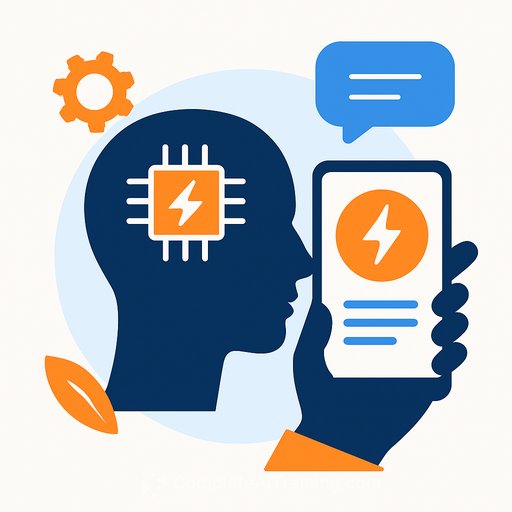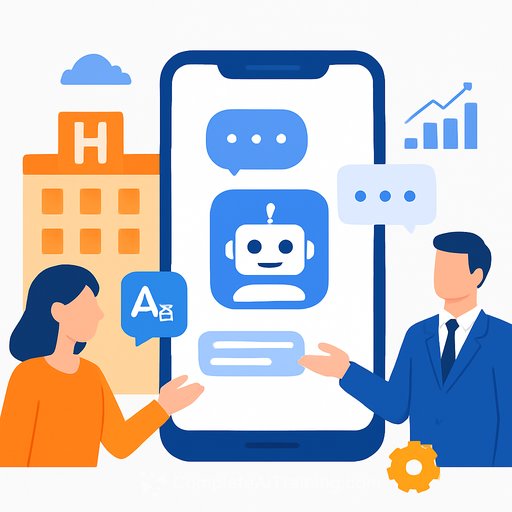AI in Customer Service: What Support Teams Need to Know
AI tools are making customer service faster, more personal, and more efficient. Chatbots, virtual agents, and smart routing systems use natural language processing (NLP) and machine learning (ML) to understand customer needs and respond instantly. These tools learn from every interaction, improving continuously to deliver smoother, more responsive experiences.
More than half of business leaders believe generative AI can change how customer experiences are designed, with personalization at the core. AI isn’t just about answering questions—it can suggest solutions, predict issues, and offer recommendations before customers even ask.
Why AI Matters for Customer Service Teams
Customers want quick, personalized help anytime they reach out. Traditional support methods can’t always keep up, leading to delays and inconsistent service. AI fills that gap by providing intelligent, always-on assistance that resolves issues swiftly and supports human agents.
Using AI strategically turns customer service into a competitive advantage. It analyzes behavior, anticipates needs, and solves problems early. This approach speeds up support and helps build lasting customer loyalty.
Common AI Applications in Customer Service
Instant Responses with Chatbots
Chatbots provide immediate answers to common questions, guiding customers through simple tasks or troubleshooting 24/7. They rely on NLP and ML to understand language and learn from past conversations, improving without manual updates. Organizations using mature AI report significantly shorter call handling times.
Virtual Customer Assistants (VCAs)
VCAs offer more advanced support, handling complex tasks like orders, account issues, or product advice. They use conversational AI to interact naturally via voice or text, often embedded in apps or smart devices.
Smart Routing of Inquiries
AI can analyze messages and route them to the right team or agent based on urgency or topic. For example, some companies have boosted agent efficiency by a third and cut wait times dramatically by using cognitive routing tools.
Predictive Customer Support
Predictive analytics spot unusual activity or upcoming needs, like subscription renewals, and trigger proactive outreach before customers report problems.
Sentiment and Emotion Detection
AI reads the tone in customer messages, identifying frustration, anger, or satisfaction. This helps support teams prioritize urgent cases and respond with more care.
Personalized Self-Service
Instead of sifting through generic FAQs, AI suggests the exact help content or tutorials customers need, based on their history and preferences.
Knowledge Management Made Smarter
AI organizes and tags vast libraries of support content, making it easier for both customers and agents to find useful information. Some systems even generate customized help articles on the fly.
Automated Follow-Ups
Robotic Process Automation (RPA) handles routine follow-ups like emails, satisfaction surveys, and case updates, freeing agents to focus on complex issues.
Quality Monitoring and Coaching
AI tools review conversations in real time to flag potential problems or policy breaches, enabling managers to coach agents quickly and improve service quality.
Voice Recognition and Smarter IVR
AI-powered voice systems understand natural speech, replacing frustrating menu navigation with intuitive, conversational support over the phone.
Key Benefits of AI in Customer Service
- Empowers Agents: AI handles simple tasks and offers real-time insights, letting agents focus on complex or sensitive issues.
- Always Available: Customers get support anytime through chatbots and virtual assistants.
- Improved Emotional Intelligence: Sentiment analysis helps teams respond thoughtfully to customer moods.
- Consistent Experience: AI ensures uniform answers across chat, email, phone, and social media.
- Cost Savings: Automation reduces the need for extra staff on routine inquiries.
- Higher Quality Control: Real-time monitoring helps catch issues and improve agent performance.
- Faster Responses: AI cuts wait times by instantly answering customer questions.
- Better Accessibility: Voice assistants and multilingual chatbots support customers with disabilities or language barriers.
- Deeper Customer Insights: AI analyzes data to help businesses understand preferences and challenges.
- Personalized Support: Interactions are customized based on customer history and behavior.
- Proactive Help: AI predicts problems and offers solutions before customers are affected.
- Scalable Support: AI manages large volumes of requests without expanding teams.
How to Implement AI Successfully in Customer Service
- Set Clear Goals: Define what you want AI to achieve and how you’ll measure success.
- Keep the Human Element: Use AI to assist, not replace, human agents.
- Be Transparent: Let customers know when they’re interacting with AI and when a human is available.
- Use Quality Data: Train AI on accurate, clean customer data for best results.
- Iterate with Feedback: Continuously improve AI using customer and agent input.
- Integrate Seamlessly: Make sure AI tools work smoothly with existing platforms.
- Focus on Personalization: Leverage data to create customized customer journeys.
- Practice Ethical Use: Prioritize privacy, transparency, and avoid bias.
- Monitor Performance: Test regularly to catch errors and improve accuracy.
- Train Your Team: Help agents understand AI tools and how to collaborate with them.
- Plan for Growth: Choose AI systems that can scale with your business needs.
- Track Metrics: Use KPIs to evaluate AI effectiveness and refine your approach.
Final Thoughts
AI is reshaping customer service by combining automation with human insight. It speeds up responses, personalizes support, and helps teams deliver better experiences. When done right, AI isn’t a replacement for support agents—it’s a powerful tool that helps them work smarter and connect with customers more effectively.
Your membership also unlocks:





